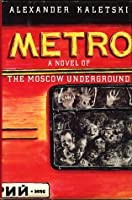
Part two of this review is here
Published nearly four decades ago, Metro has long been a Russia in Fiction favourite. We read it back in the 1980s, and at least a couple of times since, latterly re-reading it for this review.
We think of Metro as one of the last English-language novels about Russia written in the pre-Gorbachev era, before the rapid reforms and unravelling of the Soviet state began. Gorbachev came to power in March 1985. Within a couple of years, events sped up, and the certainties of the Brezhnevite era of stagnation were rapidly dropped out the back of history’s peloton.
A number of novels published in 1984 or 1985 —those that this blog, slightly tongue in cheek, refers to as Chernenko-era novels— drew on and developed the sense that the Soviet Union in the mid-1980s was on the cusp of change. Metro differs; it is very much a novel of the ‘high Soviet’ Brezhnev years.
Metro’s author, Alexander Kaletski, was (and still is) a Russian émigré in the United States. He arrived in the US in the mid-1970s, became a successful artist, and wrote this book in the mid-1980s; in English, hence usefully qualifying it for inclusion in the Russia in Fiction blog. (No doubt he was presciently anticipating that very honour …)
Metro is a wonderfully told semi-autobiographical story about a young man —Sasha, the first-person narrator— who comes to Moscow to study acting at a drama school in the city during the Brezhnev years. It is a time when the authoritarian state and hierarchical structures of the Soviet Union are ubiquitous. But to the sort of young person who studies drama, enjoys the psychological freedoms of student life, has a close-knit circle of like-minded friends, and thrives in a rapidly modernising capital city, the Moscow milieu is a challenge to be embraced, overcome, and enjoyed.
Where there are shortages, there is pleasure to be had in occasional abundance, such as when Sasha uses connections to buy that luxurious rarity, tangerines, at the special shop for the Party élite near the Kremlin.
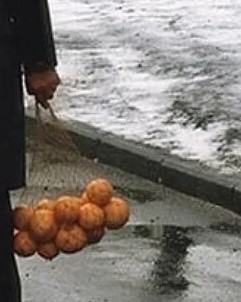
Clutching them tight, he heads back to his good friend Andrewlka’s flat.
Worried that the tangerines would scatter any second, I hugged the package all around with my left hand. My right hand was frozen stiff, I had lost one of my leather gloves somewhere … But the strings snapped, the bundle fell down on its side, brushing against the door, and a few tangerines popped out, hitting the floor… ‘Have a tangerine, but no tears, please,’ I said, picking up the fruit from the floor and holding out the package to Andrew.
‘Tangerines!’ Andrewlka shouted. ‘Sasha presented Andrewlka with tangerines. Now Andrewlka feels better – the missing link to Andrewlka’s happiness. Sound the trumpets, beat the drums. Andrewlka smells the scent of the Kremlin. Let’s hurry and wash them off. We’ve got to wash the Kremlin dust off them,’ Andrewlka said, shoving me toward the bathroom.
‘Throw them in the bathtub’ continued Andrewlka. ‘Oh no! It’s already full!’
I looked at the bathtub and was stunned. The entire tub up to the edge, and even over the edge was filled with red tangerines, just like mine.
‘Where did you get them?’ I said.
‘What?’ Andrewlka asked naively, taking his sunglasses off.
‘The tangerines.’
‘You just gave them to me’
‘Not these, the ones in the bathtub!’
‘Oh, those!’ Andrewlka looked down and finally worked it out. ‘Andrewlka took them from the living room. There are a lot of them there.’
‘What the hell are you talking about?’
‘Nobody ever believes Andrewlka. Even his best friend, Sashulka. Go and see for yourself.’ He exhaled heavily, putting his sunglasses back on his nose.
Andrewlka was right once again. The whole living room was festooned with tangerines. In the corners, they climbed halfway up the walls. The entire floor was covered with bright red balls, except for an island of rug.
Metro, pp. 314-316
Andrewlka (a diminutive of Andrei) is but one of several memorably drawn characters; eccentric, thoughtful, actorly denizens of the Moscow underground.

The double entendre of the term ‘underground’ lies behind the novel’s title.
Yes, the Moscow Metro is central to life in that huge city, and was so back in the 1960s and 1970s.
Still more central to the novel though is the Moscow underground in the sense of the alternative, semi-clandestine world of artists and performers, fixers and traders, living on the edge of the controlled and ordered world of the Soviet state.
Fascinating to us here at Russia in Fiction is the question of how much of Metro is autobiographical, how many of the stories actually happened more or less as told. The basic outline of the story —we won’t call it a plot, because it reads more true to life than artifice— matches Alexander Kaletski’s biography.
According to Russian-language websites, Alexander Kaletski was born Aleksandr Khaletskii, in Murmansk, and brought up in Tula. Just like Sasha, the first person narrator of Metro, Kaletski came from Tula to drama school in Moscow in the mid-1960s. He studied at the prestigious Shchukinskoe school.
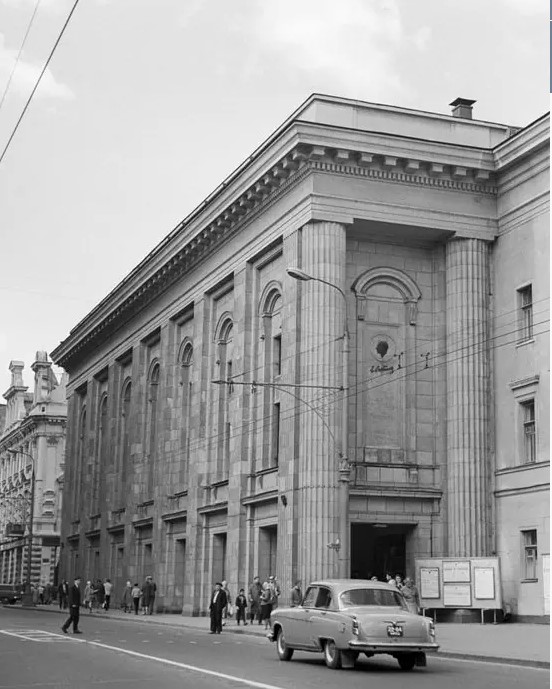
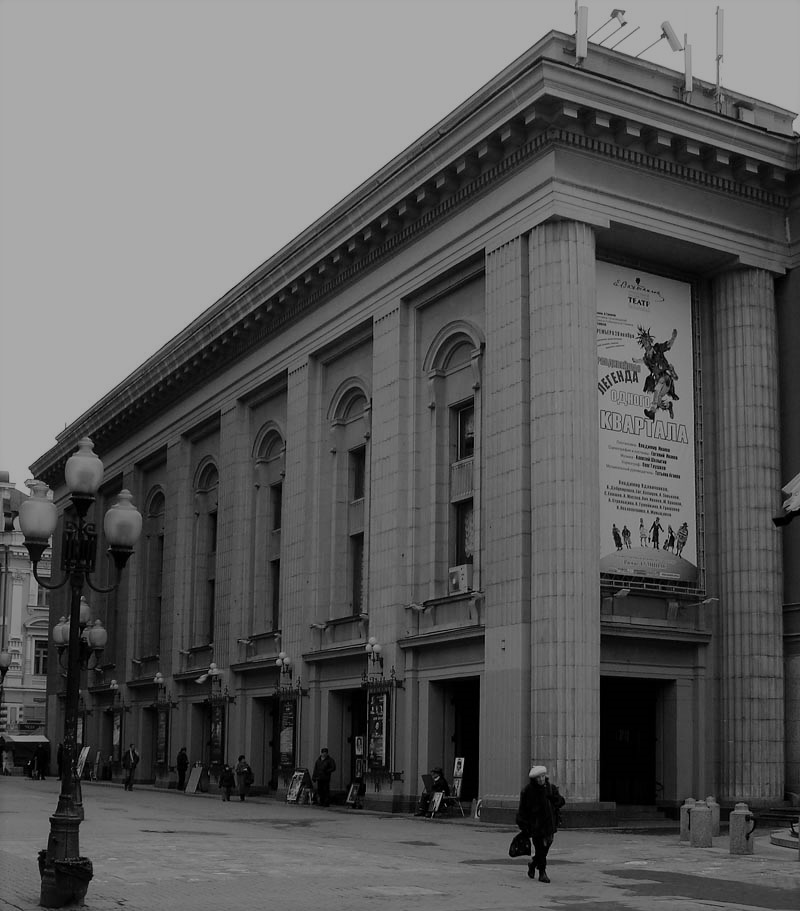
Students from there would regularly perform at the nearby Vakhtangova Theatre; familiar to anyone who has strolled along the (since 1986) pedestrianised Arbat in central Moscow.
Whilst at drama school, Kaletski met Elena Bratslavskaya. They were a beautiful couple, and took their matinee idol good looks to the silver screen in a few early 1970s Soviet movies, notably starring together in ‘Gde vy, rytsari?’ (‘Where are you, knights?’ ‘Где вы, рыцари’ (1971)).
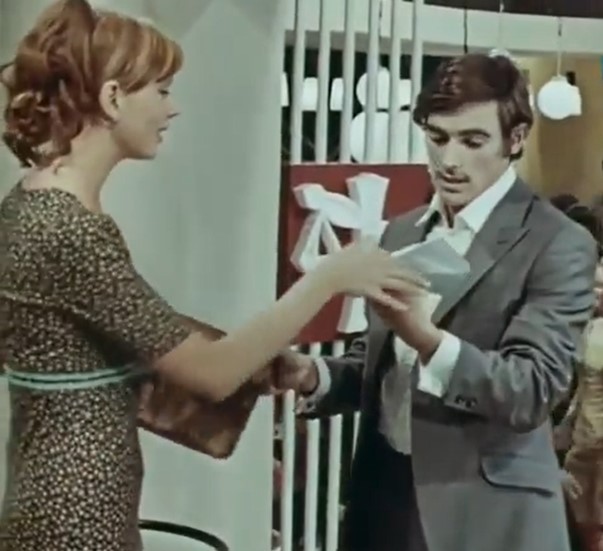
By the mid-1970s it appears that Alexander and Elena were coming under increasing pressure from the Soviet authorities and fearing arrest. In 1975 they got out of the Soviet Union, and eventually settled in the United States, where Alexander became a successful artist. The brief biographical account at www.alexanderkaletski.com takes up the story from there; illustrated by a picture of him with a semi-naked Jennifer Lopez.
Part two of this review is here